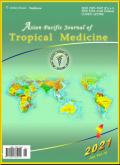Dengue hemorrhagic fever with rectus sheath hematoma: A case report
IF 1.9
4区 医学
Q3 PUBLIC, ENVIRONMENTAL & OCCUPATIONAL HEALTH
引用次数: 0
Abstract
Acute pain is a medical emergency that requires prompt abdominal evaluation and management. Dengue, a mosquito-borne arboviral infection, can lead to complications such as acute abdominal pain. A 72-year-old hypertensive female presented with high-grade intermittent fever with chills and rigors for four days. She was diagnosed with dengue fever (NS1Ag-reactive) the day before admission. A contrast-enhanced computed tomography of the abdomen showed a hematoma along the rectus sheath which was managed conservatively as per surgical opinion. Dengue hemorrhagic fever with rectus sheath hematoma. Blood transfusion and fluid therapy. Ten days after discharge, the patient reproted no pain in the right iliac fossa and the size of the hematoma was significantly reduced. Although it is rarely seen as a cause of acute abdomen, complaints of adnominal pain should never be ignored in critical or convalescent phase of dengue fever. Radiological investigations should be promptly conducted as hematoma is often difficult to be diagnosed clinically. Delay in diagnosis of rectus sheath hematoma can be fatal.登革出血热伴直肌鞘血肿:病例报告
急性疼痛是一种医疗急症,需要及时对腹部进行评估和处理。登革热是一种由蚊子传播的虫媒病毒感染,可导致急性腹痛等并发症。 一名 72 岁的女性高血压患者连续四天出现间歇性高热,伴有寒战和全身僵硬。入院前一天,她被诊断为登革热(NS1Ag 反应性)。腹部造影剂增强计算机断层扫描显示,直肠鞘沿线有血肿,根据手术意见采取了保守治疗。 登革出血热伴直肠鞘血肿。 输血和输液治疗。 出院十天后,患者右侧髂窝不再疼痛,血肿也明显缩小。 虽然腹痛很少作为急腹症的病因出现,但在登革热的危重或恢复期,腹痛的主诉绝不能被忽视。由于血肿往往难以通过临床诊断,因此应及时进行放射学检查。直肠鞘血肿的诊断延误可能是致命的。
本文章由计算机程序翻译,如有差异,请以英文原文为准。
求助全文
约1分钟内获得全文
求助全文
来源期刊

Asian Pacific journal of tropical medicine
PUBLIC, ENVIRONMENTAL & OCCUPATIONAL HEALTH-TROPICAL MEDICINE
CiteScore
4.00
自引率
9.70%
发文量
1936
审稿时长
3-8 weeks
期刊介绍:
Asian Pacific Journal of Tropical Medicine (ISSN 1995-7645 CODEN: APJTB6), a publication of Editorial office of Hainan Medical University,is a peer-reviewed print + online Monthly journal. The journal''s full text is available online at http://www.apjtm.org/. The journal allows free access (Open Access) to its contents and permits authors to self-archive final accepted version of the articles on any OAI-compliant institutional / subject-based repository.
APJTM aims to provide an academic communicating platform for international physicians, medical scientists, allied health scientists and public health workers, especially those of the Asia-Pacific region and worldwide on tropical medicine, infectious diseases and public health, and to meet the growing challenges of understanding, preventing and controlling the dramatic global emergence and re-emergence of infectious diseases in the Asia-Pacific.
The journal is proud to have an international and diverse editorial board that will assist and facilitate the publication of articles that reflect a global view on tropical medicine, infectious diseases and public health, as well as emphasizing our focus on supporting the needs of public health practitioners. The APJTM will allow us to seek opportunities to work with others who share our aim, and to enhance our work through partnership, and to uphold the standards of our profession and contribute to its advancement.
 求助内容:
求助内容: 应助结果提醒方式:
应助结果提醒方式:


